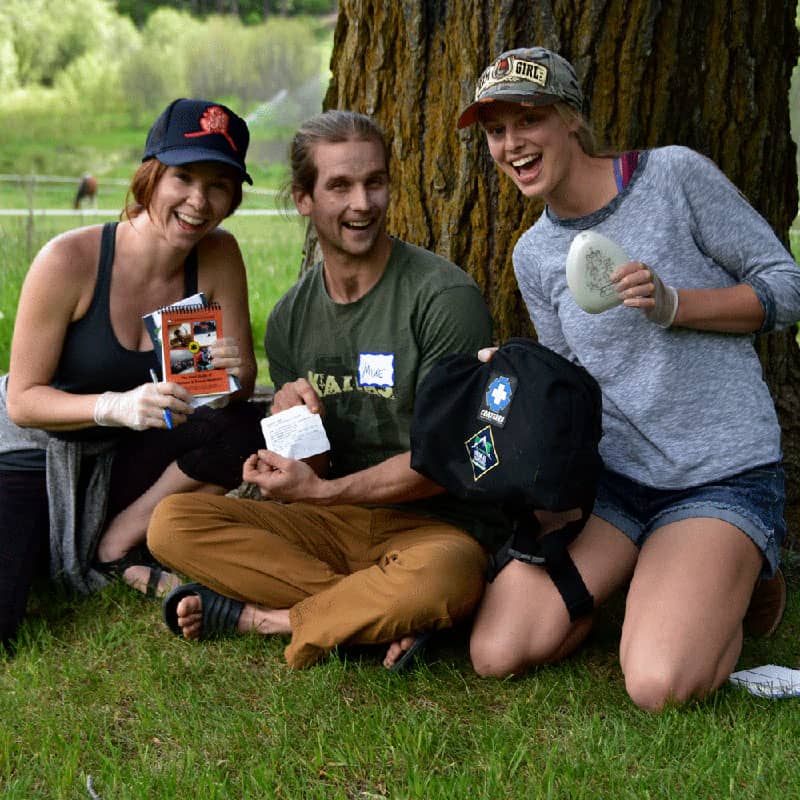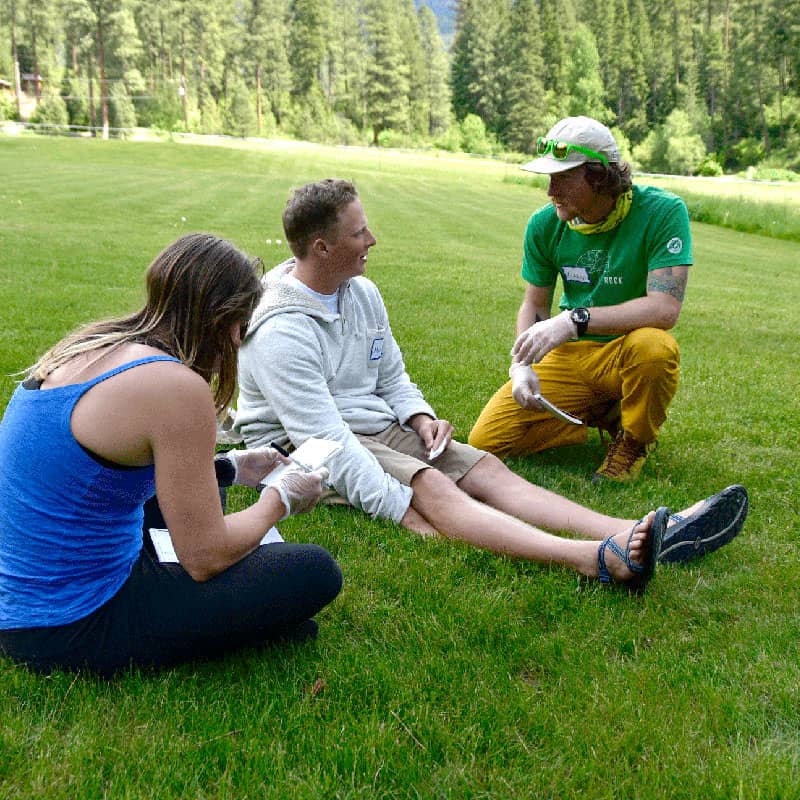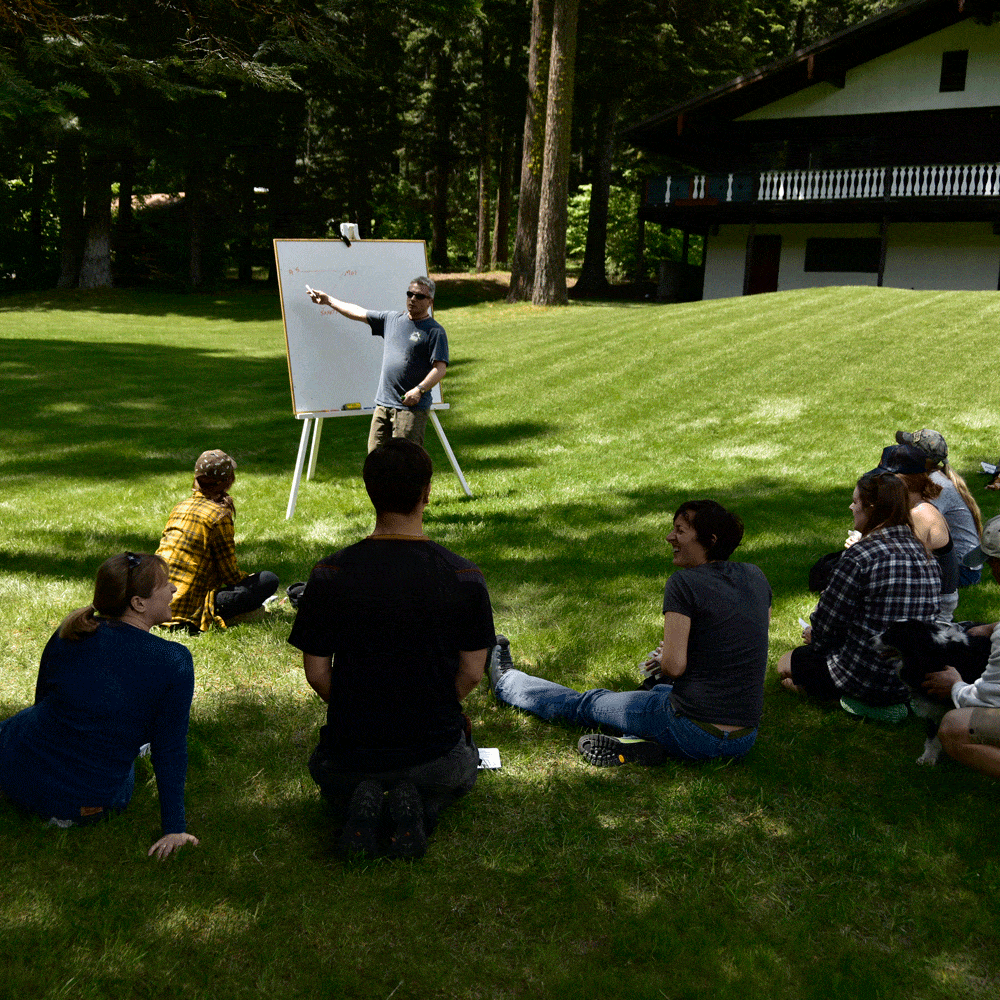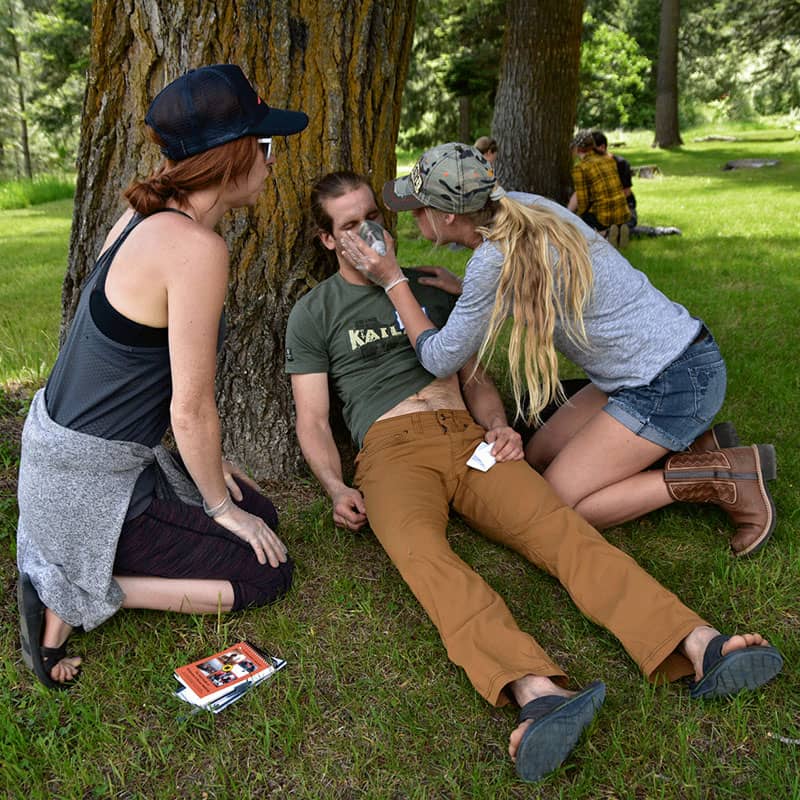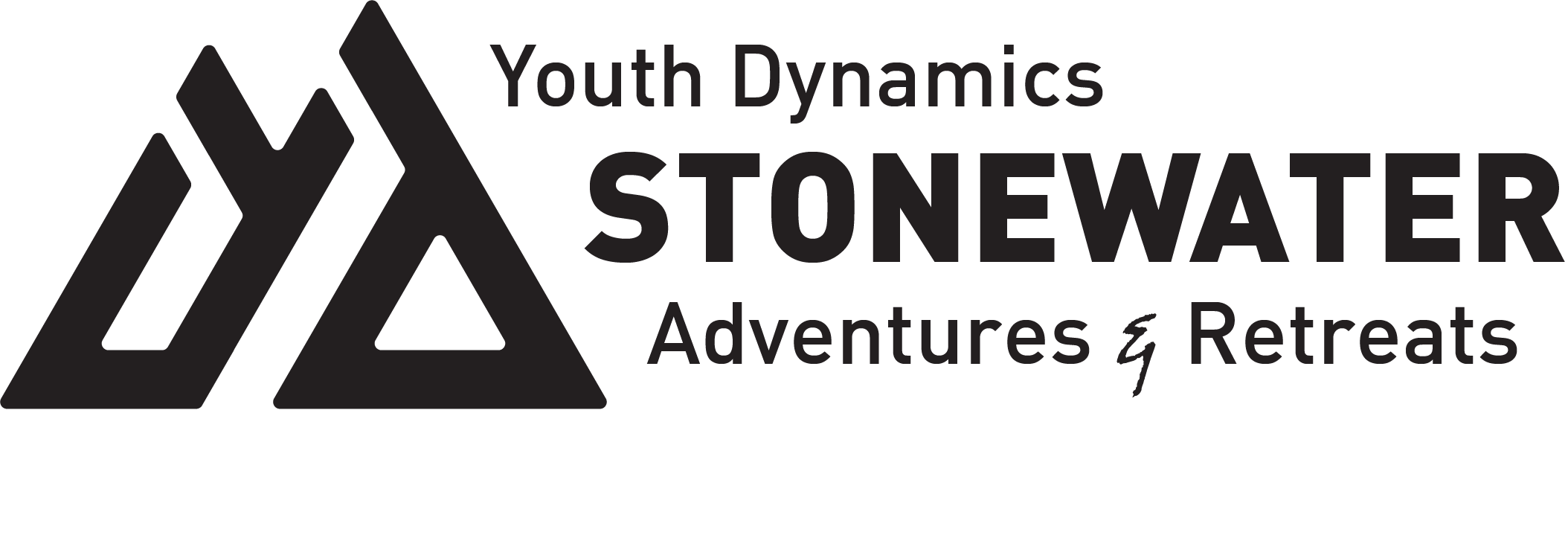Whether you are an outdoor professional or an outdoor enthusiast, being trained in medical and rescue techniques can help avoid serious consequences for you and your adventure companions. These courses are designed to meet and exceed the industry standards for medical and rescue technical skill development. All courses are taught by professional instructors with significant patient care and backcountry experience.
Wilderness First Aid (WFA)
Summary
The best and most comprehensive course of its kind to offer relevant and realistic first-aid training for seasonal outdoor activities or short-term wilderness endeavors and pursuits. Wilderness First Aid is a two-day introduction to general medical concepts and basic life support skills. It is targeted to the outdoor enthusiast on day trips or short adventures. Professional instructors teach the course with significant patient care and backcountry experience.
Description
Course Content
The expected target audience is seasonal outdoor staff and those involved in recreational wilderness trips. The course content meets the anticipated medical needs of those communities.
Course topics are:
Patient Assessment System; CPR; Circulatory System; Nervous System; Respiratory System; Fractures, Stable Injuries; Splints 1-Extremities; Hypothermia; Hyperthermia and Heat Illness; Near Drowning; Lightning Injuries; Wounds and Burns; Anaphylaxis; Lifting, Moving Extrication; Patient Carries; Backcountry Medicine
Customization
Patient assessment drills and simulations will be specific to the group, the environment, and the context of operations or the activities performed in the field.
Given the short duration of this course, emphasis is placed on hands-on activities, including PAS drills as a primary learning tool as opposed to long lectures.
Elective topics on specific environments (altitude, tropical, SCUBA, offshore medicine, etc.) can be added to the WFA course content. Please talk to the office or instructor at the time of booking.
Certifications
This course is traditionally scheduled for two days or 16 hours of instructional and practice time. Upon successful completion, students will receive certification in Wilderness First Aid and Adult CPR.
Recertification
Certifications are valid for three years. Students should retake the WFA course or consider upgrading to the Wilderness Advanced First Aid or Wilderness First Responder.
Included Materials
All teaching materials will be at no additional cost. Students will receive the following books on this course:
- Wilderness First Aid Guide
- SOAP Notebook
- Wilderness and Rescue First Aid
Equipment
We ask our sponsors and course hosts to provide outdoor equipment relevant and specific gear to their employees in remote and austere environments. Wilderness Medical Associates International will supply a specific equipment list to cover simulation and classroom needs.
Evaluation
Successful completion with certification is based on 100% attendance, satisfactory performance on homework assignments and written quizzes, demonstrated proficiency with practical skills, and a successful grade on a final written exam.
Prerequisites
Students must be at least 16 years old to participate in this course. Those under 18 years of age require the written consent of a parent or guardian.
- Age: 16+
- Season: March-May; September – October
- Length: 2 days
- Group Size: varies
- Cost: $200 – $300 per person (group discounts apply)
Wilderness Advanced First Aid (WAFA)
Summary
An entry-level course designed for professionals working in significantly remote settings for days or weeks. Wilderness Advanced First Aid is comprehensive medical training designed for remote professionals or wilderness leaders who venture into remote and challenging environments. Wilderness Medicine differs significantly from standard first aid courses and other training oriented toward urban environments. This course teaches how to manage medical emergencies when hospitals and rescue services may only be available for a short time period. We prepare students for emergency situations that involve prolonged patient care, severe environments, and improvised equipment.
Before enrolling in a course, please review our Functional Position Description. The criteria outlined in this document allow students to self-assess their ability to meet the demands of both a WMAI course and the demands of a certified wilderness medical provider in the field.
Description
Sample Syllabus
Day 1 – Introduction/Registration; Systems Based Critical Thinking; Infection Control; Patient Assessment System; Circulatory & Respiratory Systems; Adult CPR; Basic Life Support
Day 2 – Quiz/Case Studies; Nervous System, Spine Management; Musculoskeletal Injuries; Lifts, Moves, and Extrications; Splints – Extremities; Patient Assessment Drills
Day 3 – Quiz/Case Studies; Thermoregulation; Bites and Stings; Lightning; Elective Topics; Wounds and Burns; Allergies and Anaphylaxis; Improvised Patient Carries; Patient Assessment Drills
Day 4 – Case Study Review; Elective Topic; Backcountry Medicine; Medical and Legal Issues; Patient Assessment Drills; Simulations; Final Exam; Conclusion
Customization
As part of Wilderness Medical Associates International’s commitment to your medical rescue training, our instructors and management will consult your group’s needs and teach according to your group’s backgrounds, environments, and experience. Simulations and hands-on activities will be realistic and relevant. Relevant adult education is incorporated directly into our curriculum to maximize the learning of medical theory into practical skills.
Certifications
This course is scheduled for four days or 36 to 40 hours of instructional and practice time. Upon successful completion, students will receive certification in Wilderness Advanced First Aid and Adult CPR. Certification is valid for three years. The course is registered for 36 hours of continuing education credit at the First Responder level through CAPCE.
Included Materials
All teaching materials will be at no additional cost. Students will receive the following books on this course:
- The Field Guide of Wilderness Medicine & Rescue
- SOAP Notebook
- Wilderness and Rescue First Aid
- Wilderness Advanced First Aid Class Notes
Equipment
We ask our sponsors and course hosts to provide low-level outdoor equipment and any specific gear relevant to their employees in remote and austere environments. Wilderness Medical Associates will supply a specific equipment list to cover simulation and classroom needs.
Recertification
To recertify your current WMA International WAFA certification, you may retake the WAFA course or upgrade to a Wilderness First Responder (WFR) by taking a Bridge (WAFA to WFR) course.
Evaluation
Successful completion with certification is based on 100% attendance, satisfactory performance on homework assignments and written quizzes, demonstrated proficiency with practical skills, and a successful grade on a final written exam. Wilderness Medical Associates International is committed to making reasonable accommodations for any student with special needs.
Prerequisites
Students must be at least 16 years old to participate in this course. Those under 18 years of age will require the written consent of a parent or guardian.
- Age: 16+
- Season: March-May; September – October
- Length: 4 days
- Group Size: varies
- Cost: $350 – $450 per person (group discounts apply)
Bridge: WAFA to WFR
Summary
The WAFA to WFR Bridge course upgrades the Wilderness Advanced First Aid to a Wilderness First Responder (WFR) in 4 days. This course must be taken within three years of receiving the WMA International WAFA certification or an equivalent from another provider. The WFR is the definitive medical training course for all outdoor professionals and enthusiasts. This course may be a recertification for those holding a current WFR certification or equivalent from another provider whose original WFR training was at least 64 hours long. Current WMA International Wilderness, EMS Upgrade students may also use this course to recertify the wilderness portion of their certification. **If you are using this course to recertify a WMA WEMS Upgrade certification, it is your responsibility to let the sponsor know when registering and to inform the instructor on the first day of class.**
Before enrolling in a course, please review our Functional Position Description. The criteria outlined in this document allow students to self-assess their ability to meet the demands of both a WMAI course and the demands of a certified wilderness medical provider in the field.
Description
This course is presented in 36 to 40 hours over four days. Typically, mornings are devoted to lectures, discussions, and quizzes, with afternoons devoted to outdoor practical skills and scenarios. Evenings are reserved for study and assignments. Expect rescue scenarios with made-up victims and simulated wounds to prepare you for backcountry emergencies. Sessions may be videotaped for enhanced learning.
Day 1: Registration/Introduction; Review Pre-course Study Packet; Patient Assessment System; Circulatory/Respiratory Systems; PAS Drills; Basic Life Support (Healthcare Provider-level CPR)
Day 2: Quiz/Case Studies Review; Nervous System; Spine Management; Musculoskeletal; PAS Drill; Dislocations; Patient Immobilization; Litter Carries and Belays; PAS Drills
Day 3: Quiz/Case Studies Review; Emergency Childbirth; Allergy & Anaphylaxis; Altitude or Diving; Frostbite; Near Drowning; Search and Rescue; Traction Splints; Improvised Litters; Simulation and Debrief
Day 4: Case Study Review; Backcountry Medicine; Toxins; Medical Kits; PAS Drills; Written Test; Skills Testing; Conclusion
Included Materials:
The following teaching materials are provided by WMA International at no additional cost:
- The Field Guide of Wilderness and Rescue Medicine
- Wilderness and Rescue Medicine: A practical guide for the basic and advanced practitioner
- WFR Class Notes
- Wilderness Medicine Workbook
- SOAP Notebook
Certifications:
All eligible students who successfully complete the WAFA to WFR Bridge course will receive WMA International’s Wilderness First Responder certification, including anaphylaxis and BLS/Healthcare Provider-Level CPR or equivalent. All WMA International certifications remain valid for three years. This certification can be used to challenge the DOT First Responder Exam, which is at the discretion of the local or state EMS authorities. The course is registered for 36 hours of continuing education credit at the First Responder level through CAPCE.
Recertification:
Within three years, graduates may recertify by retaking the Bridge (WAFA to WFR) or completing the WFR Recertification course.
Prerequisites
Current Wilderness Advanced First Aid certification within three years of the Bridge course. If using this course to recertify, students must have proof of a valid WMA International WFR or WEMS certification or a valid WFR certification from another organization whose original training was at least 64 hours long. Proof of certification is required.
Outdoor Emergency Care (OEC) certification holders can recertify in WMA recertification courses. Upon successful completion, students will receive a WFR certification.
Students will have access to the pre-course assignments 2-4 weeks before the course. Students should complete the study guide in preparation for the system. It was designed to familiarize students with the essential points in the curriculum. Instructors will collect it at the beginning of the course, but it will not be figured into the final grade.
Students must be at least sixteen years old to participate in this course. Those under eighteen years of age will require the written consent of a parent or guardian.
- Age: 16+
- Season: March – May; September – October
- Length: 4 days
- Group Size: varies
- Cost: $350 – $450 per person (group discounts apply)
WFR Open Recertification - Wilderness First Responder Recertification
The definitive wilderness course in medical training, leadership, and critical thinking for outdoor, low-resource, and remote professionals and leaders. The Wilderness First Responder program is the ideal medical training for leaders in remote areas, including outdoor educators, guides, military, professional search and rescue teams, researchers, and those involved in disaster relief. The curriculum is comprehensive and practical. It includes the essential principles and skills required to assess and manage medical problems in isolated and extreme environments for days and weeks if necessary. This course may be recertification for those holding a current WFR certification or equivalent from another provider whose original WFR training was at least 64 hours long. To recert a WEMT, the current cert must be from WMA. Proof of certification is required.
Description
Course Content
This course is presented in 24 hours over three days. Typically, mornings are devoted to lectures, discussions, and quizzes, with afternoons devoted to outdoor practical skills and scenarios. Evenings are reserved for study and assignments. Expect rescue scenarios with made-up victims and simulated wounds to prepare you for backcountry emergencies. Sessions may be videotaped for enhanced learning.
Day 1: 8 hours – Introduction/Registration; Review Study Packet, Patient Assessment System, Basic Life Support (including BLS/Healthcare Provider-level CPR), Circulatory System, Respiratory System, Nervous System, lifts, moves and extractions, PAS Drills
Day 2: 8 hours – Musculoskeletal, Dislocations, Spine Management, Wounds and Burns, PAS Drills, Splints I – Extremities, Splints II – Spines, Simulation
Day 3: 8 hours – Allergies and Anaphylaxis, Environmental Injuries, PAS Drills, Simulation, Final Testing, Conclusion
Textbooks
All teaching materials are provided by Wilderness Medical Associates International at no additional cost. This includes SOAP Notes, our textbook, Wilderness and Rescue Medicine, and The Wilderness Medical Associates Field Guide.
Certification
All eligible students who complete this course will receive Wilderness Medical Associates’ International Wilderness First Responder, Anaphylaxis, and BLS/Healthcare Provider-level CPR certification. These certifications remain valid for three years.
Recertification
The three-day Open Recertification course may be used as a WFR recertification option for those with a current WMA International or other qualifying WFR. Only WMA International graduates can use this course as a WEMT recertification. For the WEMT recertification to be valid, WEMTs must have either a current license or certificate as an EMT-B or higher.
Within three years, graduates of this course may recertify by taking the Wilderness Advanced First Aid, Bridge (WAFA to WFR) or repeating this course.
Prerequisites
WFR recertification candidates must have passed an eligible course. To be eligible, the course should have been a wilderness-based first aid training course that was at least 64 hours long and completed within three years of the proposed recertification option. Most but not all WFRs are eligible. Any exceptions to these conditions must be verified before the course by contacting the Wilderness Medical Associates office. Proof of current certification is required at the start of the course. Without proof of certification or approval from WMA International, learners will not be eligible for WFR certification. Only WMA International-trained WEMTs are eligible for WEMT recertification through this course.
Upon registration, Stonewater will send learners the course ID number and password to access their online pre-course materials two to four weeks before the first day of their course. Learners should complete the study guide in preparation for the course. It was designed to familiarize learners with the essential points in the curriculum. Instructors will collect it at the beginning of the course, but it will not be figured into the final grade.
- Age: 16+
- Season: March-May; September – October
- Length: 3 days
- Group Size: varies
- Cost: $300 – $400 per person (group discounts apply)
Can a WAFA be used to recert a WFR?
The ideal choice would be to take a WFR Open Recert or a Bridge course to recert a WFR because they both cover the full WFR curriculum. A WAFA can be used, but only the WAFA curriculum will be covered in class.
What accommodations are available?
Depending on the time of year and availability, camping and lodging may be available onsite. Other accommodations are local camping and lodging options in Plain and Leavenworth.
How long is my certification good for?
WMA certifications are valid for 3 years, however, you must recertify before your cert expires.
Whether you are an outdoor professional or an outdoor enthusiast, being trained in medical and rescue techniques can help avoid serious consequences for you and your adventure companions. These courses are designed to meet and exceed the industry standards for medical and rescue technical skill development.
Let’s adventure together!

